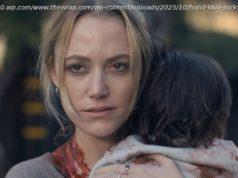 2:37 AM PST 1/24/2017
2:37 AM PST 1/24/2017
by
John DeFore
One of the most satisfying thrillers in several years, Get Out proves that its first-time director, Key & Peele costar Jordan Peele, has plenty of career options if he should grow tired of doing comedy in front of the camera. Moreover, its timing couldn’t be better, as it exploits racial fears that have become substantially more potent (not to mention more comprehensible for many white Americans) since the events of Nov. 8. Fans of K&P (RIP) may have had unrealistic hopes for Keanu , the duo’s debut feature vehicle, which underperformed when released this April. But behind the camera, Peele has delivered an unquestionably commercial genre film that should buy him a lot of leeway for future projects.
British actor Daniel Kaluuya plays Chris, a photographer going with girlfriend Rose (Allison Williams) to meet her parents for the first time. He’s concerned they may be shocked to learn their daughter is dating a black man; Rose, like any upper-class liberal, assures him he has no reason to worry. Once the pair have settled in at the family’s country estate, though, even Rose has to admit her parents and brother are giving off weird vibes. But she’s blind to something Chris immediately registers: The white family’s two black servants are creepy as hell, cordial in a zombified, too-smiley way that suggests menace instead of hospitality.
Rose’s parents, Dean (Bradley Whitford) and Missy (Catherine Keener), are eager to befriend the young man, and Missy, a shrink specializing in hypnosis therapy, wants to put Chris under to help him quit smoking. He demurs, but Missy makes it happen anyway, in a scene pairing chills with a genuine interest in Chris’ tragic childhood. (In fact, that past echoes subtly in several of the picture’s scary moments.)
The next day is an annual party the couple throws, to which pasty-white guests all arrive in black sedans and SUVs. All are overfriendly to Rose’s new boyfriend, and the faux pas they make with him are like a condensation of all the awkward things uttered by white people who don’t encounter many people of color in their social lives. Is Chris wrong to become increasingly unsettled by these people, or is he being hypersensitive?
Spoiler alert: He’s not wrong. But the precise nature of what’s going on here should remain a surprise. Suffice to say that Peele, whose TV show displayed a sharp eye for the things that make various genres tick, pairs his expertly paced screenplay with a flair for memorable detail — from a rec room suitable for Kubrick, to a blind art dealer, to the methodical way a slender girl enjoys a sugary treat.
When the film moves out of the paranoiac realm and into action, the violence is deeply satisfying, the twists delightful. Any teenager with a bucket of popcorn will get his money’s worth. But Peele, a biracial man whose comic sketches have taken race-relations humor to surprising new places, doesn’t stop there.
« Why us? Why black people?, » Chris asks, when the nature of Rose’s parents’ plans is finally explained to him. « Who knows!, » his torturer replies, before rattling off several reasons that, for those ready to dig, go beyond simple racism — suggesting a critique even of whites who celebrate the coolness and talent of black people in a too-proprietary way. Early in the film, Chris is shown to be a man unruffled by everyday racist sleights, treating them as part of the cost of existing in this world. Get Out , in between its scary moments (and yes, the funny ones scattered throughout), may be suggesting it’s time to pay such signals more mind.
Production companies: Blumhouse Productions, QC Entertainment
Distributor: Universal Pictures
Cast: Daniel Kaluuya, Catherine Keener, Allison Williams, Bradley Whitford, Caleb Landry Jones, Lil Rel Howery, Erika Alexander, Keith Stanfield
Director-screenwriter: Jordan Peele
Producers: Jason Blum, Edward H. Hamm Jr., Sean McKittrick
Executive producers: Raymond Mansfield, Shaun Redick, Couper Samuelson
Director of photography: Toby Oliver
Costume designer: Nadine Haders
Editor: Gregory Plotkin
Composer:
Casting director: Terri Taylor
Venue: Sundance Film Festival
Rated-R, 103 minutes






